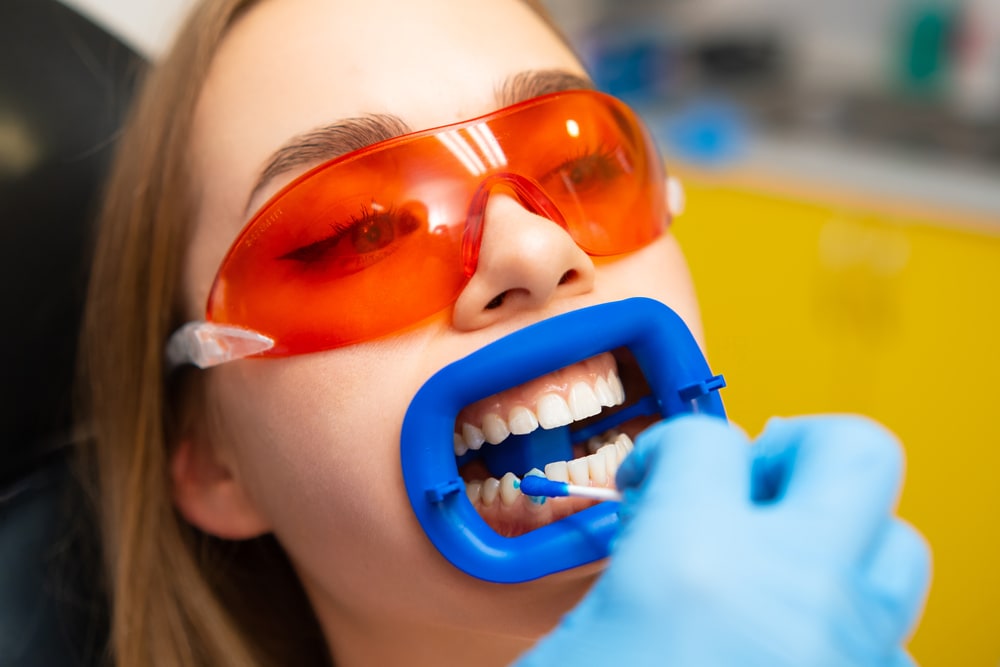People have long considered a bright smile to be a sign of youth, vitality, and good hygiene. Teeth whitening is a safe, effective, and affordable way to transform stained or discoloured teeth into a dazzling smile.
Read on to learn more about the benefits of whitening your teeth and the process involved.
What is Teeth Whitening?
Teeth whitening is a process of lightening the natural colour of teeth by removing stains and discolouration. Tooth enamel consists of microscopic pores that can accumulate stains over time and cause teeth to look yellow or stained. Tooth whitening products contain bleaching agents such as carbamide peroxide that penetrate the pores of the enamel and lighten the colour of the teeth. Professional teeth whitening is administered by dental professionals and is a safe and effective way to achieve brighter smiles.
When considering teeth whitening, it is important to understand that the process can cause temporary sensitivity. This sensitivity can occur while the bleaching agents are working to penetrate the enamel and remove the stains. To prevent any gum irritation, it is advised only to use dental treatments prescribed by a professional.
While home teeth whitening kits are available, it is important to note that they are not as powerful as professional teeth whitening. It is recommended to consult a dental professional to discuss any questions or concerns before using over-the-counter whitening products.
Why Should I Whiten My Teeth?
Discolouration of dental enamel can be improved through a whitening procedure. Teeth whitening is a process that uses hydrogen peroxide to lighten the shade of the teeth. This process can be done in a dental clinic or at home with over-the-counter products. It is important to note that teeth whitening can only lighten superficial or surface stains and not intrinsic staining. However, for those with discoloured teeth due to lifestyle choices such as smoking, drinking coffee, or eating certain foods, teeth whitening can still be a great option.
Benefits of teeth whitening include:
- Improved oral health: Teeth whitening can help reduce the risk of cavities, gum disease, and other dental issues by removing surface stains and plaque.
- Improved confidence: A brighter and whiter smile can boost your self-esteem and give you the confidence to smile more.
- Person-to-person contact: Teeth whitening can be done in a chair treatment at the dental clinic or with an experienced professional.
- Reduced staining: Teeth whitening can remove surface stains, making them less likely to stain again.
What Are the Benefits of Teeth Whitening?
Dental enamel lightening through whitening procedures can provide several advantages. One of the main advantages of teeth whitening is its effect on gum disease. When teeth are whitened, it can reduce the risk of gum disease since it improves oral hygiene. Furthermore, the effects of teeth whitening can reduce extrinsic stains caused by bacteria that build up on the teeth. This can be particularly beneficial for those who drink coffee or tea or for those who smoke, as teeth whitening can help to reduce staining caused by these substances.
Another advantage of teeth whitening is that it can help to improve the colour of teeth by several shades. By using tooth whitening products, it is possible to achieve a white, bright smile. Additionally, teeth whitening is a procedure that can be done without worrying about any permanent damage to the teeth. This means that if the desired shade of white is not achieved, then the procedure can be repeated to achieve the desired results.
Finally, a bright white smile can be beneficial for confidence. Having white teeth can help to boost self-confidence, as it can be a sign of good oral hygiene and health. This can ultimately lead to improved mental health and well-being.
Overall, teeth whitening can provide several advantages, such as reducing the risk of gum disease, improving the colour of teeth several shades lighter, and boosting self-confidence. As such, it can be an effective way to transform a stained smile into a stunning one.
What Types of Teeth Whitening Are Available?
Various methods of teeth whitening are available to reduce discolouration of the teeth. These treatments vary in terms of cost and effectiveness, with counter products providing a temporary, less expensive solution and professional bleaching offering a more expensive yet effective treatment.
Over-the-counter whitening products, such as whitening toothpaste, whitening strips, or whitening gels, are available at drugstores without a prescription. These products remove surface stains. However, they typically only make teeth a few shades whiter.
In-chair whitening, also known as professional bleaching, is a dental procedure that is done in a dental practice and is considered the most effective whitening method. The procedure often takes one hour and can make teeth up to eight shades whiter. This type of whitening may cause temporary tooth sensitivity. However, it is considered a safe and effective treatment.
No matter which whitening method is chosen, it is important to understand that tooth stains can reappear over time and that touch-up treatments may be necessary. It is important for patients to follow the instructions of their dentist and use whitening products as directed in order to maintain a bright, healthy smile.
What is the Teeth Whitening Process?
The process of reducing the discolouration of teeth involves a range of treatments. Teeth whitening is one of the most popular and effective ways to brighten natural teeth dramatically. Through the use of bleaching solutions, whitening gels, and other methods, shades can be made up to eight shades brighter. The process of teeth whitening can be done in a dental office or in the comfort of a home.
At the dentist’s office, the teeth whitening process begins with a thorough examination of the patient’s teeth and gums. This is to ensure that the patient is a good candidate for the whitening procedure. After that, the dentist will take a shade guide to determine the current shade of the patient’s teeth and to establish a goal for the desired outcome.
For chair teeth whitening, the dentist will first apply a hydrogen peroxide gel to the enamel surfaces of the teeth. The gel will remain on the teeth for up to 15 minutes and then be removed and reapplied until the desired shade is achieved.
At home, teeth whitening can also be done with a variety of kits. The whitening gel is placed on the teeth, and then a special tray is placed over the teeth to hold the gel in place. Different kits have different instructions, and the gel must usually be left on the teeth for a certain period of time.
With either professional or at-home whitening, the results can be dramatic and satisfying. Teeth whitening can reduce tooth discolouration and give the patient a beautiful smile. Patients can be confident that they can enjoy brighter, whiter teeth after undergoing the teeth whitening process.
How Long Does Teeth Whitening Last?
Whitening of the teeth can provide long-lasting effects, with results lasting for months to years. It is a cosmetic treatment that can lighten the natural colour of the teeth without the need for any specialised equipment. The results are dependent on the individual and the length of time that the whitening process is used. Generally, the longer the period of time that the teeth are whitened, the longer the results will last. However, it is important to note that any whitening process can cause permanent damage to the teeth if used for too long.
It is important to maintain good oral hygiene while whitening the teeth. This means brushing and flossing regularly and rinsing the mouth with water afterwards. Additionally, avoiding coloured foods and drinks can help to keep the teeth looking brighter for longer. For those who want to maintain their teeth whitening results for longer, they can use products such as blue light or oil pulling.
Finally, a take-home whitening kit can also be used in conjunction with professional whitening treatments. These kits can be used every few months to maintain the desired whitening results. It is important to note that whitening treatments are not recommended for those who have had root canal treatments, as the whitening process could cause further damage to the teeth.
With proper care and maintenance, teeth whitening can provide long-lasting effects and help to transform a stained smile into a stunning one.
What Are the Risks of Teeth Whitening?
Though teeth whitening can provide long-lasting results, there are risks associated with the process. Cosmetic procedures such as whitening can be dangerous if not handled properly. The outer layer of the teeth can be weakened if exposed to too much acidic food and drink, causing the enamel to erode. If too much of the enamel wears away, the teeth are more prone to cavities and other forms of decay. It is important to protect the teeth with a rubber shield during the whitening process.
Counter treatments such as baking soda or whitening strips can cause gingival irritation if used too frequently. Internal bleaching techniques, such as applying a bleaching gel to the teeth, can also be hazardous. Intrinsic stains, which are embedded deep in the teeth, may not be lightened by these treatments and can only be removed with professional whitening.
In order to reduce the risk of teeth whitening, it is best to consult a dentist before pursuing any cosmetic whitening procedure. Teeth whitening products should be used as instructed, and the dentist should be consulted for advice on the best whitening methods and products for individual cases.
Overall, teeth whitening can provide a stunning transformation for many people, but it is important to consider the potential risks when considering cosmetic procedures. By consulting a dentist and using the correct whitening methods, people can safely and effectively whiten their teeth and enjoy long-lasting results.
How Can I Maintain My Whitened Teeth?
Maintaining whitened teeth involves taking certain precautions to reduce the risk of discolouration. To ensure pearly whites stay white, it is important to be aware of extrinsic staining, which can occur from certain foods, drinks, and smoking. Additionally, it is important to maintain a healthy mouth through regular brushing, flossing, and visits to the dentist.
Tooth discolouration can begin to occur if teeth are not properly cared for. To prevent discoloured teeth, one should avoid dark-coloured liquids, such as coffee, tea, and red wine, as well as darker-coloured fruits and vegetables. Additionally, smoking should be avoided as much as possible.
For those who have already undergone an office tooth whitening treatment, it is important to be mindful of treatment considerations. The whitening process can leave teeth slightly more sensitive to hot and cold temperatures, as well as cause a slight surface roughness. To prevent discolouration, one should avoid acidic foods and drinks and use whitening toothpaste once a week.
To ensure brighter teeth remain brighter, one should visit the dentist for regular check-ups. Professional dental cleanings should be done every six months to help remove any plaque or build-up that may have occurred since the initial office treatment. During these visits, the dentist can also determine if a touch-up whitening treatment is necessary.
Key Takeaways
Teeth whitening can be a transformative experience, resulting in a smile that shines brighter than ever before. With the variety of treatments available, it has never been easier to find a solution that works for you.
With proper maintenance, you can keep your teeth sparkling for years to come, as if they were freshly polished diamonds in the night. Teeth whitening can be an investment towards a brighter, more confident you.
Make the most of your smile with Butler Dental in Butler, WA. At Butler Dental, we offer professional teeth whitening services that are tailored to your individual needs. With a wide range of treatments available, we can help you achieve the smile of your dreams. Invest in your confidence and book an appointment at Butler Dental in Butler, WA, today!

